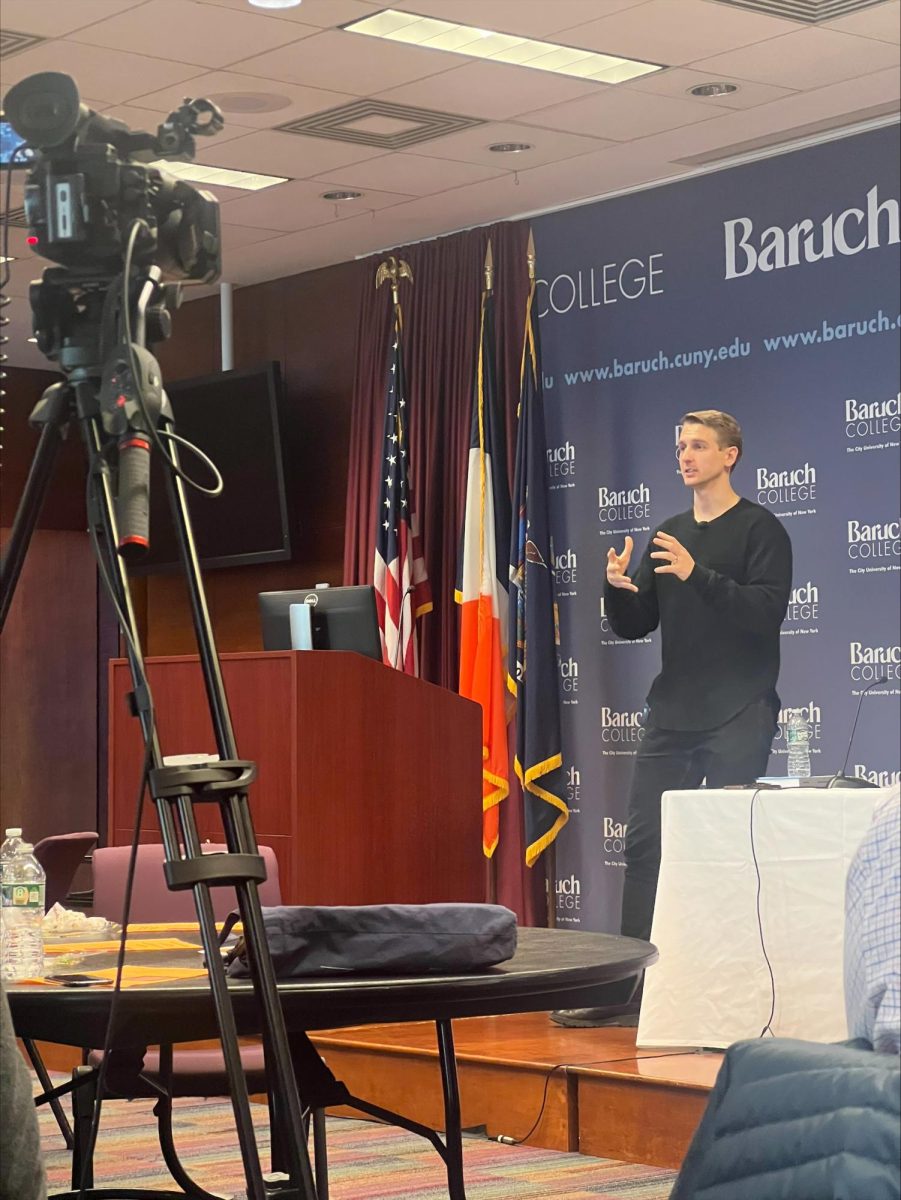Viktor Bunin did not expect his blog posts to matter.
The 2014 Baruch graduate shared many anecdotes during the Weissman Center for International Business-run event, the 167th Mitsui Lunch-Time Forum hosted at Baruch College on Feb. 20.
When he first interviewed for a position at Bison Trails, the blockchain infrastructure platform later acquired by Coinbase Global Inc. in 2021, he didn’t think his interviewers were likely to have read a blog post he wrote criticizing them — let alone bring it up. It tied into his point that following your interests first is a surefire way to find your niche.
Bunin gave a frank overview of his career before advocating for the cryptocurrency industry’s strengths.
“When I was in school, I was in your seats thinking about what I wanted to be and what kind of job I wanted to have,” Bunin began. “I felt like I was gazing at this big tree of possibilities and trying to select the leaf that I wanted to end up on out of the tens of thousands of leaves… So I took a little bit of a different path that I’ll tell you about today — pursuing whatever is the most interesting to me at that moment, trying a big branch on [the] tree rather than trying to select the leaf, and continuing to do that over and over again, until I finally ended up on a leaf.”
Originally a finance major, he ended up switching to a double major in economics and psychology. After asking himself what he was most interested in, Bunin landed on consulting.
His lucky break came one night when, while running a shop that sold puzzles at the Union Square Holiday Market, he met a consultant working at Ernst & Young LLP.
“I ended up exchanging information with her, sent her my resume, she helped me edit it, and submitted it,” he said. “Halfway through my senior year, when I thought I was definitely going to leave school without a job, I ended up securing a job, which I was very, very happy for.”
But by 2017, he felt his care for his work beginning to wane. That was when he and a friend put $3,000 into Bitcoin.
It consumed him — quitting EY in 2018 to break into cryptocurrency consulting, he began to see how his interest in behavioral economics could influence token and incentive designs.
“I just thought, wait a minute. I’ve been training for this role for the last 10 years before the job even existed,” he said.
After getting hired as operations manager at Bison Trails, a startup at the time, they quickly realized the job title didn’t fully capture his responsibilities. Consequently, they created the protocol specialist role, a position that Bunin says has become a staple in the cryptocurrency industry.
He likened the role’s responsibilities to those of traditional product managers. But within cryptocurrency, it entails tracking every advancement within the plethora of cryptocurrency ecosystems surrounding each coin and operationalizing those insights to drive product strategy, pricing, marketing and more.
His protocol specialist job title remains, now under Coinbase Cloud.
Bunin spoke on three takeaways when considering what makes crypto unique — and why it matters.
Citing the decades-old technologies that prop up our current financial system, including wire transfers and ACH, Bunin expressed a desperate need to give contemporary commerce a facelift.
“[Crypto] enables you not only to move assets,” he said. “You can also have entire financial institutions that are based in code that can do things like enable you to lend and borrow, for example, or enable you to do commerce or make a payment.”
Secondly, Bunin invoked one of cryptocurrency’s biggest selling points: ownership.
He explained the internet’s current lack of tangible ownership by describing three kinds of networks: protocol, corporate and cryptocurrency networks.
Protocol networks form the backbone of the internet’s infrastructure, defining how computers communicate and emails are sent. While these networks are free and have been widely adopted, corporate networks, which are operated by Big Tech and social media companies, centralize profit innovation.
“A corporate network, what you have today, is Facebook, TikTok, Twitter, all of them,” he said. “We spent almost the entirety of our digital lives within these walled gardens, almost like theme parks where you have a totally curated experience.”
Cryptocurrency networks’ value lies in the hybridization of the two, Bunin said. Innovation has a low take rate that cannot be easily increased or centralized like corporate networks, but they have more than the near-profitless protocol networks, enough to fund their own development. The “best of both worlds.”
The third takeaway was the coins’ ability to serve as money themselves. Tokens like Bitcoin and Ethereum can become a safe harbor from volatility like inflation, with a rate of inflation that is more democratically governable.
“If you try to change it, everybody would know that it is the process of being changed, they can make decisions about it,” he said.









